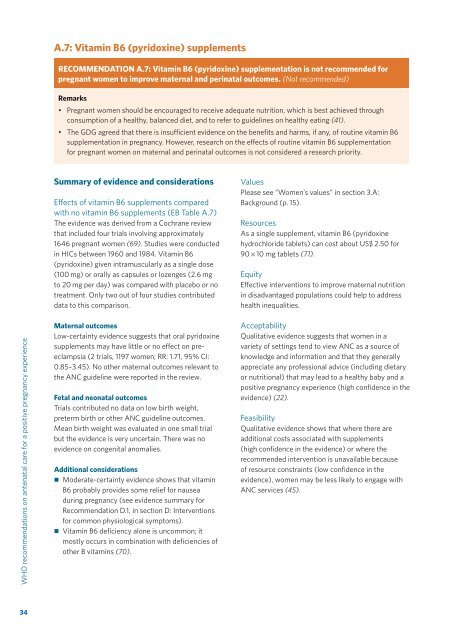WHO recommendations on antenatal care for a positive pregnancy experience
5pAUd5Zhw
5pAUd5Zhw
Create successful ePaper yourself
Turn your PDF publications into a flip-book with our unique Google optimized e-Paper software.
A.7: Vitamin B6 (pyridoxine) supplements<br />
RECOMMENDATION A.7: Vitamin B6 (pyridoxine) supplementati<strong>on</strong> is not recommended <strong>for</strong><br />
pregnant women to improve maternal and perinatal outcomes. (Not recommended)<br />
Remarks<br />
• Pregnant women should be encouraged to receive adequate nutriti<strong>on</strong>, which is best achieved through<br />
c<strong>on</strong>sumpti<strong>on</strong> of a healthy, balanced diet, and to refer to guidelines <strong>on</strong> healthy eating (41).<br />
• The GDG agreed that there is insufficient evidence <strong>on</strong> the benefits and harms, if any, of routine vitamin B6<br />
supplementati<strong>on</strong> in <strong>pregnancy</strong>. However, research <strong>on</strong> the effects of routine vitamin B6 supplementati<strong>on</strong><br />
<strong>for</strong> pregnant women <strong>on</strong> maternal and perinatal outcomes is not c<strong>on</strong>sidered a research priority.<br />
Summary of evidence and c<strong>on</strong>siderati<strong>on</strong>s<br />
Effects of vitamin B6 supplements compared<br />
with no vitamin B6 supplements (EB Table A.7)<br />
The evidence was derived from a Cochrane review<br />
that included four trials involving approximately<br />
1646 pregnant women (69). Studies were c<strong>on</strong>ducted<br />
in HICs between 1960 and 1984. Vitamin B6<br />
(pyridoxine) given intramuscularly as a single dose<br />
(100 mg) or orally as capsules or lozenges (2.6 mg<br />
to 20 mg per day) was compared with placebo or no<br />
treatment. Only two out of four studies c<strong>on</strong>tributed<br />
data to this comparis<strong>on</strong>.<br />
Values<br />
Please see “Women’s values” in secti<strong>on</strong> 3.A:<br />
Background (p. 15).<br />
Resources<br />
As a single supplement, vitamin B6 (pyridoxine<br />
hydrochloride tablets) can cost about US$ 2.50 <strong>for</strong><br />
90 × 10 mg tablets (71).<br />
Equity<br />
Effective interventi<strong>on</strong>s to improve maternal nutriti<strong>on</strong><br />
in disadvantaged populati<strong>on</strong>s could help to address<br />
health inequalities.<br />
<str<strong>on</strong>g>WHO</str<strong>on</strong>g> <str<strong>on</strong>g>recommendati<strong>on</strong>s</str<strong>on</strong>g> <strong>on</strong> <strong>antenatal</strong> <strong>care</strong> <strong>for</strong> a <strong>positive</strong> <strong>pregnancy</strong> <strong>experience</strong><br />
Maternal outcomes<br />
Low-certainty evidence suggests that oral pyridoxine<br />
supplements may have little or no effect <strong>on</strong> preeclampsia<br />
(2 trials, 1197 women; RR: 1.71, 95% CI:<br />
0.85–3.45). No other maternal outcomes relevant to<br />
the ANC guideline were reported in the review.<br />
Fetal and ne<strong>on</strong>atal outcomes<br />
Trials c<strong>on</strong>tributed no data <strong>on</strong> low birth weight,<br />
preterm birth or other ANC guideline outcomes.<br />
Mean birth weight was evaluated in <strong>on</strong>e small trial<br />
but the evidence is very uncertain. There was no<br />
evidence <strong>on</strong> c<strong>on</strong>genital anomalies.<br />
Additi<strong>on</strong>al c<strong>on</strong>siderati<strong>on</strong>s<br />
• nModerate-certainty evidence shows that vitamin<br />
B6 probably provides some relief <strong>for</strong> nausea<br />
during <strong>pregnancy</strong> (see evidence summary <strong>for</strong><br />
Recommendati<strong>on</strong> D.1, in secti<strong>on</strong> D: Interventi<strong>on</strong>s<br />
<strong>for</strong> comm<strong>on</strong> physiological symptoms).<br />
• nVitamin B6 deficiency al<strong>on</strong>e is uncomm<strong>on</strong>; it<br />
mostly occurs in combinati<strong>on</strong> with deficiencies of<br />
other B vitamins (70).<br />
Acceptability<br />
Qualitative evidence suggests that women in a<br />
variety of settings tend to view ANC as a source of<br />
knowledge and in<strong>for</strong>mati<strong>on</strong> and that they generally<br />
appreciate any professi<strong>on</strong>al advice (including dietary<br />
or nutriti<strong>on</strong>al) that may lead to a healthy baby and a<br />
<strong>positive</strong> <strong>pregnancy</strong> <strong>experience</strong> (high c<strong>on</strong>fidence in the<br />
evidence) (22).<br />
Feasibility<br />
Qualitative evidence shows that where there are<br />
additi<strong>on</strong>al costs associated with supplements<br />
(high c<strong>on</strong>fidence in the evidence) or where the<br />
recommended interventi<strong>on</strong> is unavailable because<br />
of resource c<strong>on</strong>straints (low c<strong>on</strong>fidence in the<br />
evidence), women may be less likely to engage with<br />
ANC services (45).<br />
34


